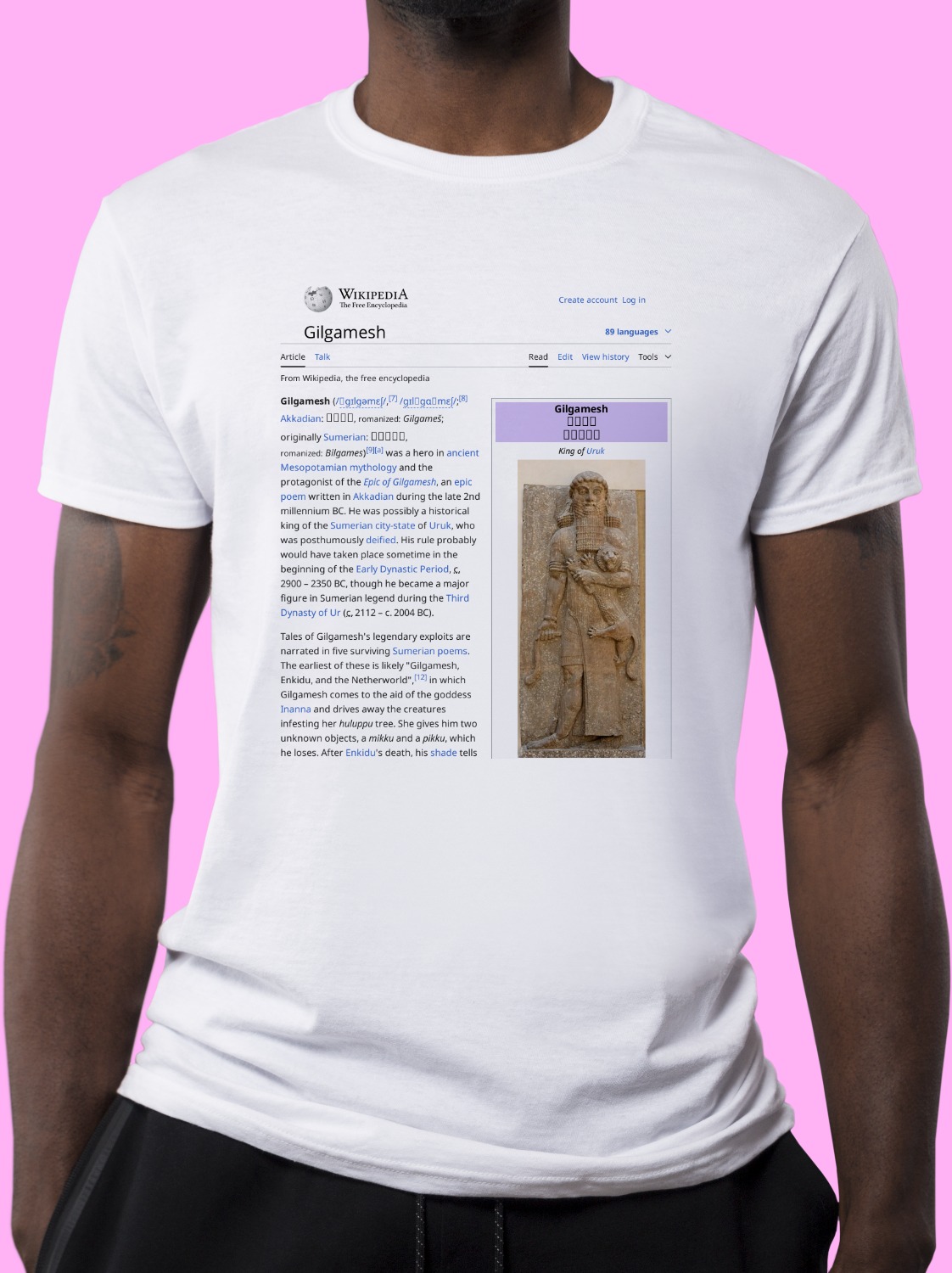
Gilgamesh Shirt
A classic cotton tee emblazoned with the Wikipedia article on Gilgamesh ↗.
cotton tee emblazoned with the Wikipedia article on Gilgamesh ↗.- Preshrunk jersey knit
- Seamless double-needle 2.2 cm collar
- Taped neck and shoulders
- Tear away label
- Double-needle sleeve and bottom hems
- Quarter-turned to eliminate centre crease
Gilgamesh (, ; Akkadian: 𒀭𒄑𒂆𒈦, romanized: Gilgāmeš; originally Sumerian: 𒀭𒄑𒉋𒂵𒎌, romanized: Bilgames) was a hero in ancient Mesopotamian mythology and the protagonist of the Epic of Gilgamesh, an epic poem written in Akkadian during the late 2nd millennium BC. He was possibly a historical king of the Sumerian city-state of Uruk, who was posthumously deified. His rule probably would have taken place sometime in the beginning of the Early Dynastic Period, c. 2900–2350 BC, though he became a major figure in Sumerian legend during the Third Dynasty of Ur (c. 2112 – c. 2004 BC).
Tales of Gilgamesh's legendary exploits are narrated in five surviving Sumerian poems. The earliest of these is likely "Gilgamesh, Enkidu, and the Netherworld", in which Gilgamesh comes to the aid of the goddess Inanna and drives away the creatures infesting her huluppu tree. She gives him two unknown objects, a mikku and a pikku, which he loses. After Enkidu's death, his shade tells Gilgamesh about the bleak conditions in the Underworld. The poem Gilgamesh and Aga describes Gilgamesh's revolt against his overlord Aga of Kish. Other Sumerian poems relate Gilgamesh's defeat of the giant Huwawa and the Bull of Heaven, while a fifth, poorly preserved poem relates the account of his death and funeral.
In later Babylonian times, these stories were woven into a connected narrative. The standard Akkadian Epic of Gilgamesh was composed by a scribe named Sîn-lēqi-unninni, probably during the Middle Babylonian Period (c. 1600 – c. 1155 BC), based on much older source material. In the epic, Gilgamesh is a demigod of superhuman strength who befriends the wild man Enkidu. Together, they embark on many journeys, most famously defeating Humbaba (Sumerian: Huwawa) and the Bull of Heaven, who is sent to attack them by Ishtar (Sumerian: Inanna) after Gilgamesh rejects her offer for him to become her consort. After Enkidu dies of a disease sent as punishment from the gods, Gilgamesh becomes afraid of his own death and visits the sage Utnapishtim, the survivor of the Great Flood, hoping to find immortality. Gilgamesh repeatedly fails the trials set before him and returns home to Uruk, realizing that immortality is beyond his reach.
Most scholars agree that the Epic of Gilgamesh exerted substantial influence on the Iliad and the Odyssey, two epic poems written in ancient Greek during the 8th century BC. The story of Gilgamesh's birth is described in an anecdote in On the Nature of Animals by the Greek writer Aelian (2nd century AD). Aelian relates that Gilgamesh's grandfather kept his mother under guard to prevent her from becoming pregnant, because an oracle had told him that his grandson would overthrow him. She became pregnant and the guards threw the child off a tower, but an eagle rescued him mid-fall and delivered him safely to an orchard, where the gardener raised him.
The Epic of Gilgamesh was rediscovered in the Library of Ashurbanipal in 1849. After being translated in the early 1870s, it caused widespread controversy due to similarities between portions of it and the Hebrew Bible. Gilgamesh remained mostly obscure until the mid-20th century, but, since the late 20th century, he has become an increasingly prominent figure in modern culture.
About Wikishirt
Wikishirt is a retail experiment that lets you buy a shirt with any Wikipedia Article printed on it. There are over 5 million Wikipedia articles, so we have over 5 million shirts.Check out our homepage for random featured shirts and more!